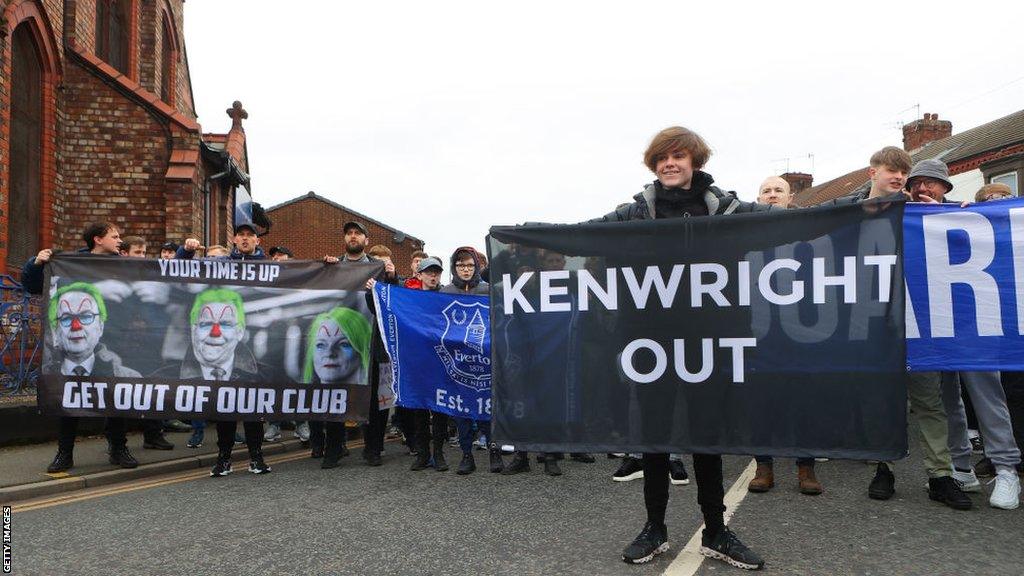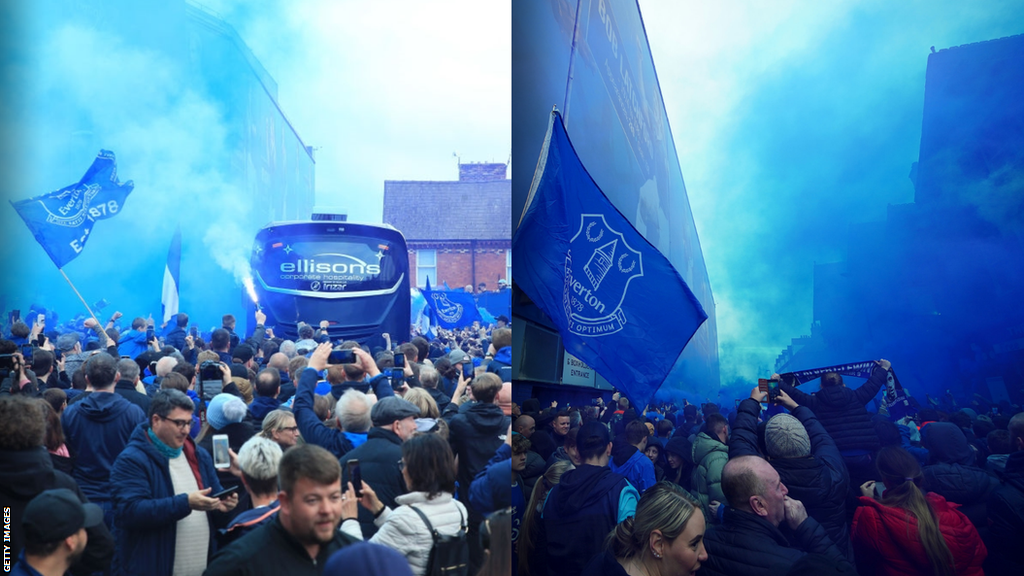Everton: Toxic civil war between fans and board ripping Toffees apart
- Published
Can Everton ever be great again?
Everton have endured a miserable 2023.
With five matches remaining of the season, the threat of relegation from the Premier League again looms large for Sean Dyche's side - just 12 months after Frank Lampard and a raucous Goodison crowd saved them from the same fate.
This campaign has been a struggle both on and off the pitch, and the Toffees, who are 19th, face a huge Premier League basement battle at Leicester City on Monday (20:00 BST).
Dropping into the Championship would be catastrophic for both clubs but especially Everton, having posted losses of more than £430m over the past five years and with their new stadium on Bramley Moore Dock being built but in need of financing.
They are also awaiting news of any potential sanctions after being referred to an independent commission by the Premier League over an alleged breach of financial fair play rules, with the club "prepared to robustly defend" their position.
And to add to the toxicity and uncertainty around the Merseyside club, a civil war has erupted between the Everton board and disgruntled supporters, who feel chairman Bill Kenwright is not up to the job and owner Farhad Moshiri has squandered much of the £750m he has invested.
How relationship between club and fans broke down

Everton supporters have been protesting against the club's board this season
The turn of the year saw the relationship between Everton and their faithful nosedive to a point where it looked irreparable.
Following the 4-1 home defeat by Brighton on 3 January, club sources said chief executive Denise Barrett-Baxendale was manhandled by a male fan as she left the Goodison Park directors' box.
After the 2-1 loss against Southampton 11 days later, clips shared on social media showed home-grown forward Anthony Gordon's car blocked by a number of supporters while defender Yerry Mina, external was confronted.
The turbulence on the touchline has continued too - Frank Lampard was sacked on 23 January, with the side second from bottom, and replaced by Sean Dyche, Everton's sixth permanent manager in five years.
Despite selling Gordon to Newcastle for £45m on 29 January - leaving them short of options up front - the club ended up failing to sign a player in the winter transfer window.
Though they won two of their first three games under former Burnley boss Dyche, a run of one victory in their past 10 matches sees them remain entrenched in trouble inside the relegation zone.
And until recently, a group of supporters held peaceful protest marches before every home game since Dyche's appointment, expressing their frustration at the running of the club by Moshiri and the board of directors, which includes Kenwright, Barrett-Baxendale, chief financial officer Grant Ingles and Toffees legend Graeme Sharp.
The defeat against the Seagulls in January was the last home game attended by the five key decision-makers, having been warned of a "real and credible threat to their safety" following "threatening correspondence".
Merseyside Police was called in to liaise with the club following the alleged threats, which included reports of death threats sent to Kenwright and intimidating calls and emails to Barrett-Baxendale.
Club sources called the situation a "sad state of affairs", adding that while the supporters have a right to protest, a line had been crossed in the manner of their disapproval.
Merseyside Police issued a statement on 16 January saying that no threats or incidents were reported to officers prior to Everton's game against Southampton.
On 10 March, a bizarre incident saw a panel featuring a picture of Kenwright stolen from outside Goodison. It was found in a canal six days later. Merseyside Police was again involved.
Then on 21 April, Kenwright wrote a lengthy open letter to the 'All Together Now' campaign, defending the way the club is run and denying suggestions health issues are affecting his ability to do the job.
On Friday, the Everton fan advisory board responded with a statement, external and made a call of no confidence in Kenwright, stating his open letter needed to show "leadership, understanding and accountability" but showed the "absolute opposite".
'I can't sleep with the thought of relegation'
The All Together Now, external campaign saw 86 groups and social media channels come together to write a letter to Moshiri demanding change at board level. Former players Alan Stubbs and Michael Ball were among its signatories.
But the club are making attempts to repair the relationship with their fans and are hoping for a galvanised approach to the season end, with both parties aiming for a finish that would see them achieve the mutual goal of remaining in the top flight.
Supporters have agreed to halt their pre-match protests and instead a significant number lined Goodison Road before the Newcastle game on Thursday to passionately welcome the team bus, with chanting and blue smoke from flares filling the Merseyside sky.

Just short of a year ago (left), Everton fans welcomed the team coach with a raucous reception before going on to beat Chelsea. They did the same on Thursday evening (right), but lost against Newcastle
A blog post,, external pitched by The 1878s group, published on Everton's website on Wednesday, read: "Last season showed that when we are together, we are a force to contend with.
"For our final games, let's recreate that and more. Together, anything is possible."
And before kick-off against the Magpies, the famous Gwladys Street End unfurled a banner which read 'Fight For Us' - arranged following consultation between the club and supporters.
But the match did not go as hoped, with that early optimism sapped away by a demoralising 4-1 defeat, their 17th loss of the campaign.
"There is no way the current board members will be accepted by the fanbase again," Chris Hannon, spokesman for the All Together Now movement, told BBC Sport. "There have been conversations with the fans' forum to repair the divide but for me it is about Everton being better.
"Fans feel the chairman needs to be replaced by someone who will take the club forward to be more of a force both on and off the pitch.
"We're in a relegation battle at the moment so luckily for the board, we are trying to push the team more. If we go down then things will ramp up massively.
"I can't sleep with the thought of relegation. We survived last season by the skin of our teeth but not many teams survive more than two relegation scares.
"We need to get a win away from home and that Leicester game is a massive one for us."
TV money 'biggest factor' of relegation
Nine-time First Division champions Everton and 2015-16 Premier League winners Leicester face off on Monday with the realistic prospect of at least one or both clubs going down at the end of the month.
This is Everton's 119th top-flight campaign, but their proud record of staying in the highest division since 1954 is under real threat.
Last year, Leicester finished eighth and earned a total of £128m in Premier League broadcast and central commercial revenue, while Everton earned £117m.
The difference between the guaranteed broadcasting revenue for a club in the Premier League against a year one parachute payment following relegation is around £60m, which would be a significant reduction in revenue for both clubs to contend with.
Everton also have the added difficulty of paying for their new 52,888-capacity stadium, with owner Moshiri reportedly, external searching for outside investment.
Earlier this year, he revealed costs for the new venue could amount to £760m, a £260m increase on figures quoted by the club last year.
"Both Everton and Leicester are historically well supported clubs so will still generate significant crowds in the Championship," Dr Dan Plumley, principal lecturer in sport finance at Sheffield Hallam, told BBC Sport.
"The biggest factor for the two will be the reduction in broadcast money. With sustainability, it is not just about looking at the bottom line profit or loss.
"If you are making losses, it tends to be that an owner is footing the bill for that and then you are into conversations about the motives of the owners and their long-term desire to be involved at the football club.
"With Leicester, we saw the chairman write off a debt of £194m in February, while a real positive for Everton is that the new stadium will generate income through football, non-football events and hospitality.
"However, all of that is better realised to a higher potential as a Premier League club."
A critical 28-day period with five matches remaining will determine whether that happens or not.

Our coverage of Everton is bigger and better than ever before - here's everything you need to know to make sure you never miss a moment
